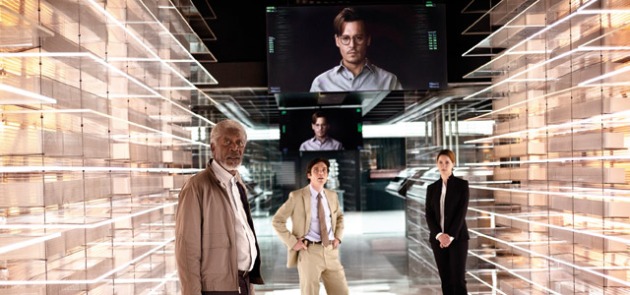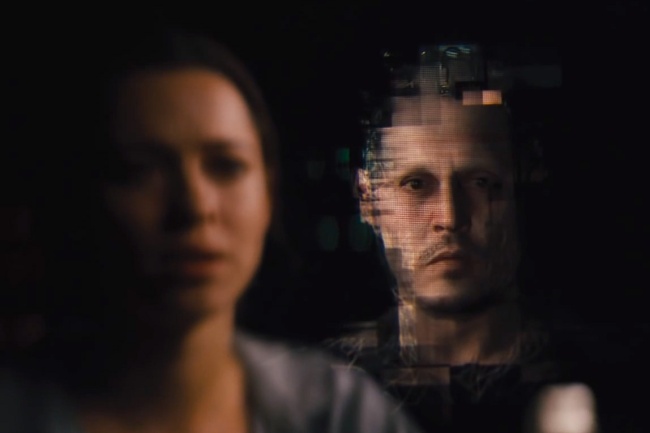If Christopher Nolan’s greatest shortfall in ‘Inception’ was over-reliance on exposition, the central misfire of Wally Pfister’s directorial debut is just the opposite. Awash with ambiguities less the product of attempted philosophical debates too great for a two-hour running time and more a storytelling smokescreen shielding its ultimately insubstantial depth, Pfister struggles to redirect his energies away from understandably cinematographic-centric instincts (having been director of cinematography for every Nolan-helmed production since 2000’s ‘Memento’), and towards fleshing out a fully engrossing storyline.
Dr. Will Caster (Johnny Depp) is at the forefront of developing artificial intelligence, until an attack by ‘anti-machine’ extremists leaves many of his colleagues dead, decades of research lost, and Will himself induced with radiation poisoning. His body wasting away, his wife Evelyn (Rebecca Hall) resolves to attempt uploading his consciousness into the fruit of their work, a quantum computer. As apparent a success her efforts may initially be, whether the mind within the software is truly and completely her husband becomes increasingly uncertain, and as its ambition grows so does her desperation to keep faith.
Evelyn: “Where are you going?”
Will: “Everywhere”.
It’s always refreshing to see Depp away from his trademark performances of heroic eccentricity, and while there’s little sense of self-challenging on his part, he’s a fitting choice for a character so exteriorly understated yet brimming with intellect, the ambiguity over the verisimilitude of his cyber-spatial reincarnation maintained to great effect by his nuanced performance. Hall continues to balance mainstream roles with niche cinema, finding something of a middle ground here with Evelyn’s Faustian descent from ambition to desperation, and Paul Bettany complements his every scene as the close friend to the Casters helpless to protect them from themselves. The Nolan Factor sees to the rest, with Pfister recruiting regular Nolan heavyweights Morgan Freeman and Cillian Murphy for their reliable supporting talents.
Agent Buchanan: “You think it’s really him?”
Joseph Tagger: “At any rate, his mind is evolving erratically. I’m not sure it matters anymore”.
“So you’re trying to create a god”, a lecture attendee asks Will prior to his ‘transcendence’. “Isn’t that what man has always tried to do?”, Will responds thoughtfully, a loaded exchange of views on the surface that amidst alternative contexts would likely garner praise as meaty food for thought, yet here impacts little more than had he simply said “let me answer your question with another question”. High-concept films rarely provide answers to their ponderings, and rarer still actively seek to do so, preferring generally to establish a dialogue and facilitate discussion. ‘Transcendence’ does not provide answers, nor indicate any such inclination, but neither does it allow for much exploration into its own premise. A brush with collective intelligence conflicting with individualism here, an understated flirtation with power and obsession there. Scenes are frequently bookended by languid shots of scene minutiae, informative and illustrative but rarely progressive or instrumental, leaving an underlying sensation of yearning for depth out of reach.
“Once online, a sentient machine will quickly overcome the limits of biology; in a short time, its analytic power will become greater than the collective intelligence of every person born in the history of the world. Some scientists refer to this as the Singularity. I call it Transcendence”.
Enjoyable and silly for all it’s lofty conceptual aims, distinctly influenced by the secrets to Nolan’s success just as much as his failures, as debuts go ‘Transcendence’ no disaster, and Pfister can expect an interesting career in the chair if he can endeavour to stay outside his comfort zone for a while.
Quality: 2/5
Entertainment: 3/5
Averaged Out: 3/5
Patchman




